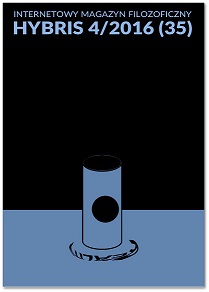C.G. Jung and the postmodern discourse
DOI:
https://doi.org/10.18778/1689-4286.35.05Keywords:
Jung, depth psychology, postmodernismAbstract
Today we cannot say with certainty what the Swiss psychologist attitude towards postmodernism would be, therefore it is reasonable to ask: what are the similarities and differences between the Depth Psychology and the above-mentioned trend? Omitting the underlying absolutism present in the Jung`s “system” (revealing itself in the archetypal construction not only of human world but reality overall (in radically idealistic interpretation of Jung`s philosophy) reveals to us the variety of expressions, that appear to imply a totally different tendency present in his writings. Instead of strengthening unchangeable foundations of reality here we find their dissolution; instead of creating monolithic human psychology we find far-reaching relativization (theoretical and moral); instead of universalistic rules of individual development and precise ethical obligations concerning every human separately, we find vast margin of freedom and great number of equally valuable paths of personality development left to the individual. In the proposed papers I would like to show Jung not as the hypothetical enemy of postmodernism but more as a proto-postmodernist, or perhaps even as a postmodernist par excellence.
References
Baudrillard, Jean, 2005, Symulakry i symulacja, przeł. Sławomir Królak, Warszawa: Wydawnictwo Sic!.
View in Google Scholar
Jacobi, Jolande, 1993, Psychologia C.G. Junga, przeł. Stanisław Łypacewicz, Warszawa: Wydawnictwo Wodnika.
View in Google Scholar
Jung, Carl, Gustav, 2005, Psychologia a religia Zachodu i Wschodu, przeł. Robert Reszke, Warszawa: Wydawnictwo KR.
View in Google Scholar
Jung, Carl, Gustav, 2009, O rozwoju osobowości, przeł. Robert Reszke, Warszawa: Wydawnictwo KR.
View in Google Scholar
Jung, Carl, Gustav, 2010, Życie symboliczne, przeł. Robert Reszke, Warszawa: Wydawnictwo KR.
View in Google Scholar
Jung, Carl, Gustav, 1997, Typy psychologiczne, przeł. Robert Reszke, Warszawa: Wrota KR.
View in Google Scholar
Jung, Carl, Gustav, 2010, Zaratustra Nietzschego, Notatki z seminarium 1934-1939, wydał James L. Jarrett, T.1, tłum. Robert Reszke, Warszawa: Wydawnictwo KR.
View in Google Scholar
Jung, Carl, Gustav, 2010, Zaratustra Nietzschego, Notatki z seminarium 1934-1939, wydał James L. Jarrett, T.2, tłum. Robert Reszke, Warszawa: Wydawnictwo KR.
View in Google Scholar
Jung, Carl, Gustav, 2009, Przyczynki do symboliki Jaźni, przeł. Robert Reszke, Warszawa: Wydawnictwo KR.
View in Google Scholar
Lyotard, Jean-Francois, 1997, Kondycja ponowoczesna, przeł. Małgorzata Kowalska, Jacek Migasiński, Warszawa: Fundacja Aletheia.
View in Google Scholar
Rorty, Richard, 2009, Przygodność, ironia i solidarność, przeł. Wacław Jan Popowski, Warszawa: W.A.B..
View in Google Scholar
Vattimo, Gianni, 2006, Koniec nowoczesności, przeł. Monika Surma-Gawłowska, Kraków: Universitas.
View in Google Scholar
Welsch, Wolfgang, 1998, Nasza postmodernistyczna moderna, przeł. Roman Kubicki, Anna Zeidler-Janiszewska, Warszawa: Oficyna Naukowa.
View in Google Scholar
Downloads
Published
How to Cite
Issue
Section
License

This work is licensed under a Creative Commons Attribution-NonCommercial-NoDerivatives 4.0 International License.






